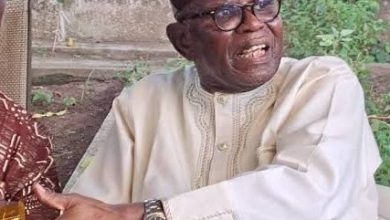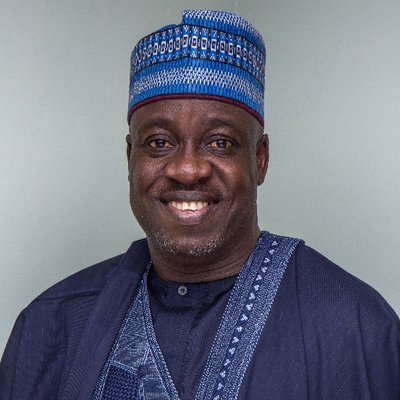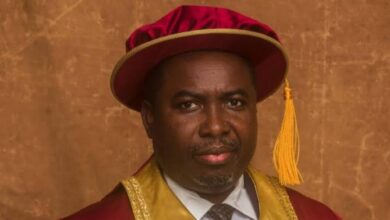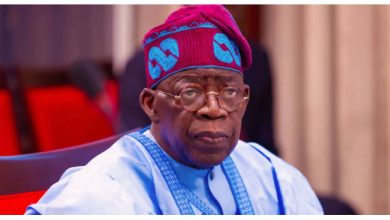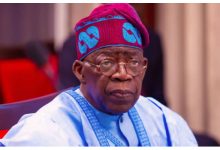The Rot in the Judiciary, By Femi Falana (2013)

On Tuesday 15 January 2019, a Nigerian in the Diaspora (America), Abass Adetunji, challenged The DEFENDER to, in the clear wake of Nigerian lawyers avoiding to investigate and criticize the Chief Justice of Nigeria (CJN) Walter Samuel Onnoghen so as not to lose cases before his courts, embark on investigation into the rots of Judiciary in the country. In the course of our investigation we stumbled over a comprehensive comment by Mr. Femi Falana, an astute, fiery human rights lawyer and distinguished Senior Advocate of Nigeria (SAN), which represented his comments on the rots in the judiciary of the country when he spoke as Guest Speaker at the launch of the Law Journal of the Law Students Society, Faculty of Law, University of Ilorin, Kwara State in honour of Chief Folake Solanke (SAN), on Wednesday 22 May 2013. We therefore decided to re-publish it as it contains the liver and intestine of the issue at stake. This paper was first published in a section of the media including Premium Times on May 27, 2013.
In addition to lack of judicial independence in Nigeria some highly placed judges have betrayed their oath of office by engaging in wanton corruption. The removal of some very corrupt judges by the defunct Sani Abacha junta on the recommendations of the Justice Kayode Eso Panel did not deter the others who have continued to dent the image of the judiciary and thereby erode public confidence in the judiciary.
At a recent public event in Ibadan, Oyo State, Chief Folake Solanke SAN had pointed out that for corruption to be effectively tackled in the country the fight has to be begin with the judiciary.
In calling on the judiciary to play a critical role in prosecuting members of the public who run foul of the law the legal luminary opined, that “The judicial process is the only method by which erring members of the society can be made accountable and be made to pay the penalty for wrongdoing.
Yes, there is corruption in the land, and only the court can purge the society. But alas, what about the judiciary itself?”
The Chairman of this occasion, the Honourable Justice Mustapha Adebayo Akanbi, a former President of the Court of Appeal and the pioneer Chairman of the ICPC is a man of extraordinary moral force. His commitment to the defence of the rule of law, good governance and accountability is legendry. As a man of principle his lordship has a penchant for speaking truth to power. The organizers of this event could not have chosen a more suitable personality to chair this occasion than a jurist who has dedicated his life to the struggle for social justice and good governance.
It is public knowledge that the National Judicial Council under the leadership of the Chief Justice of Nigeria, the Honourable Justice Maryam Aloma Muktar, is quitely but effectively prosecuting a war against judicial corruption.
Since the war has thrown up some challenges for the legal profession we shall review the strategies adopted by the NJC and explore ways of institutionalising the reforms with a view to repositing the judiciary to serve the interests of the Nigerian people. This is the only way to ensure that the reforms survive the relatively short tenure of the Chief Justice.
Before making my presentation permit me to enter a caveat: I know that the majority of Nigerian judges are not corrupt. The fight against judicial corruption is therefore being waged against the few that have perfected the act of selling justice to the highest bidders and thereby dented the image of the judicary.
The Subversion of Judicial Independence by the Judiciary
In addition to lack of judicial independence in Nigeria some highly placed judges have betrayed their oath of office by engaging in wanton corruption. The removal of some very corrupt judges by the defunct Sani Abacha junta on the recommendations of the Justice Kayode Eso Panel did not deter the others who have continued to dent the image of the judiciary and thereby erode public confidence in the judiciary.
Under the current democratic dispensation some of the heads of the judiciary do not believe in the independence of the judiciary. In fact, one of them became so close to the Presidency that his nominees for the office of the Attorney-General of the Federation have been appointed on two occasions. The crisis of confidence in the judiciary has been compounded by the influence of vested political interests.
Upon the conclusion of the 2011 General Elections a plot was hatched by the authorities to remove the President of the Court of Appeal, Justice Ayo Isa Salami. As he was suspected to have sympathy for a leading opposition political party the Federal Judicial Service Commission chaired by the then Chief Justice of Nigeria, Justice Aloysius Katsina-Alu recommended that Justice Salami be promoted to the Supreme Court.
Not only did Justice Salami reject the recommendation he proceeded to spill the beans when he averred in a suit in court that the Chief Justice had asked that the governorship election petition in Sokoto State be decided in favour of the candidate of the ruling party. Notwithstanding the suit filed by Justice Salami against his planned removal the National Judicial Council decided to place Justice Salami on suspension pending the investigation of the allegations of misconduct against Chief Justice.
At that juncture both Messrs Segun Oni and Olagunsoye Oyinlola whose elections as governors of Ekiti and Osun states respectively had been annulled by the Court of Appeal alleged that Justice Salami was in constant telephone conversation with leaders and lawyers of the Action Congress of Nigeria during the hearing of some election petitions. The National Judicial Council also decided to investigate the grave allegations of both politicians.
Not convinced that the National Judicial Council would examine the matter in a dispassionate manner the Nigerian Bar Association resolved to set up its own panel of inquiry to investigate the roles of all the dramatis personae including its own members in the Sokoto governorship election petition saga. The reports of the NJC and the NBA were mired in controversies.
While the CJN was exonerated by the NJC Justice Salami was asked to tender apology for lying on oath even though it was found that the CJN actually asked Justice Salami to change the panel that had concluded the hearing of the appeal. But as far as the NJC was concerned the CJN interfered in the case in the interest of the
judiciary! On its own part the NBA exonerated Justice Salami, indicted the CJN and some legal practitioners. Upon the retirement of Justice Katsina-Alu CJN the matter was revisited by the NJC which turned round to exonerate Justice Salami, lifted his suspension and decided to recall him. However, President Jonathan has refused to allow him to resume duties as the President of the Court of Appeal on the ground that the matter is pending in court. Although the matter has been left for judicial determination by the court the crisis has done incalculable damage to the image of the Nigerian judiciary.
It has, in fact, been said to be partly responsible for the increasing wave of judicial corruption in the country in the last couple of years. All manners of ex parte orders are issued by the judges while judgments totally devoid of justice are handed down by judges. Men and women of means and influence charged with theft of billions of Naira are either freed or convicted and asked to pay ridiculous low fines.
The Nigerian judiciary recently became a butt of jokes before the international community when a former governor who was discharged by the Federal High Court was convicted and sentenced to a 14-year jail term by a judge in the United Kingdom on the same evidence.
It was therefore not surprising when at the swearing-in-ceremony of the Honourable Justice Musdapha, as the Chief Justice of Nigeria on September 27, 2011, President Goodluck Jonathan expressed concern over the “widespread perception of a growing crisis of integrity in the judiciary”. While charging the newly appointed Chief Justice to address the crisis of confidence in the judiciary the President pointed out that “A partisan judge compromises his or her oath of office and acts unfairly. A corrupt judge disgraces the Bench on which he or she sits and the title that he or she wears”
In several public statements thereafter, the Honourable Justice Musdapher condemned judicial corruption, delay in the administration of justice, criticized plea bargain and made recommendations for judicial reforms. His Lordship also intervened to stop the manipulation of the Court of Appeal in some election matters. A Federal High Court judge was directed by the Chief Justice to reverse an ex parte order which he had granted restraining Independent National Electoral Commission from conducting the governorship election in Cross River State. The illegal ex parte order was issued on the eve of the said election.
The Emergence of Justice Aloma- Muktar (CJN)
I first met the Honourable Justice Maryam Aloma Muktar as a High Court Judge in Kano in 1984. My client, a trade union had sued a powerful Lebanese company in the Kano State High Court for illegally withholding the check dues deducted from the wages of all the workers in its employment. The company which had boasted that it had the judiciary in its pocket was taken aback when the trial judge, Justice Muktar granted the reliefs sought by the plaintiff and ordered the company to refund and pay to the union the check off dues which it had illegally withheld. Since then I have watched the judge from afar and followed her impeccable judicial carrier.
In a country where judicial corruption has become virtually institutionalised I make bold to say that Justice Muktar has never been associated with corrupt practices or any form of abuse of office. She is conservative but ready to take a radical stand in defence of the rule of law. She is quiet but aggressive
in dealing with cases of corruption.
Her decision to team up with Adesola Oguntade JSC (as he then was) and Walter Onnoghen JSC in writing powerful dissenting opinions in the controversial case of Mohammadu Buhari v Independent National Electoral Commission convinced the reactionary forces in the legal establishment that she could rock the boat if allowed to become the head of the country’ judiciary. The clean bill of health given to Justice Ayo Isa Salami, the suspended President of the Court of Appeal by a Committee of the National Judicial Council chaired by Justice Muktar was the last straw that broke the carmel’s back. A plot was therefore hatched to prevent her from becoming the Chief Justice of Nigeria.
It would be recalled that the system had successfully refused to make her the Chief Judge of Kano State in 1987 even though she was the most qualified judge in the state judiciary at the material time. History was to repeat itself in April 2010, when the reactionary forces perfected the strategy to deny her the opportunity to assume the headship of the Nigerian judiciary. In a dubious move to promote her to irrelevance Justice Muktar was offered the post of the Chief Justice of The Gambia under a special bilateral arrangement between Nigeria and The Gambia. But she saw through the plot and rightly declined to take up the offer. Hence, in July 2012, President Goodluck Jonathan nominated Justice Aloma Muktar, as the most Senior Justice of the Supreme Court to succeed the then outgoing Chief Justice, the Honourable Justice Dahiru Musdapher.
During the screening of the Chief Justice designate, Honourable Justice Aloma Muktar by the Senate on July 2012 some Senators took her to task on the disturbing rate of corruption in the judiciary. Without any hesitation whatsoever, she was quick to admit that the situation “is very bad and I am saddened by it. I will try as much as possible to ensure that as for the bad eggs that are there, there will be a cleansing by the NJC based on petitions.”
It is doubtful if the Senate members were convinced that she could muster the courage to rid the Judiciary of corruption. But based on her impressive performance at the screening session coupled with her solid credentials the entirety of the senate members unanimously confirmed her appointment. Having had promises of reforms made by political leaders and judicial officers broken in the past Nigerians took Justice Muktar’s undertaking to reform the judiciary with a pinch of salt. But since she took over the leadership of the nation’s judiciary she has repositioned the National Judicial Council to take up the urgent task of restoring confidence in the judiciary. Thus, in less than ten months of her tenure the CJN has made it clear to judges and Senior Advocates of Nigeria that it is no longer business as usual. Disturbed by the total loss of confidence in the judiciary by Nigerians the current Chief Justice of Nigeria, Mrs. Justice Aloma Muktar has resolved to take remedial steps to restore the image of the judiciary. The National Judicial Council under her leadership held an emergency meeting on February 21, 2013 to review the pending cases of judicial misconduct against some judges. At the end of its deliberations the NJC recommended the compulsory retirement of two judges namely, Justice Charles Archibong of the Federal High Court and Justice Thomas Naron of the Plateau State High Court for judicial misconduct. According to the statement issued by the NJC Justice Naron, the Chairman of the dissolved Osun State Election Petition Tribunal was found to have regularly communicated with ex-Governor Olagunsoye Oyinlola’s counsel-Otunba Kalejaiye SAN through telephone and SMS messages while the election petition filed by Ogbeni Rauf Aregbesola was being tried by the Tribunal.
With respect to Justice Archibong it was established that he dismissed the 26-count charge against Mr. Erastus Akingbola, former Managing Director of the defunct Intercontinental Bank without taking his plea; made caustic and reckless remarks on the competence of four Senior Advocates of Nigeria and refused to release a certified true copy of his ruling to the lawyers; convicted some PDP leaders for contempt when the contempt application was not served on them, gave judgment in a case commenced by original summons without written addresses filed by parties. Owing to such litany of errors the NJC concluded that Justice
Archibong did not have any grasp of the law and procedure.
Another judge, Okechukwu Okeke J. of the Federal High Court was given a stern warning three weeks to his retirement from the Bench. While Mohammed Talba of the Federal Capital Territory High Court has been placed on 12-month suspension the Chief Judge of the FCT High Court, Justice Lawal Hassan Gunmi has opted to resign instead of waiting for the investigation of the allegations of misconduct leveled against him. The Legal Practitioners Privileges Committee headed by the Chief Justice has suspended a Senior Advocate of Nigeria sine die while the NJC has referred another one to the NBA for discipline on account of allegations of profession misconduct.
To prevent judges from embarking on foreign trips at the expense of their judicial duties no judge can travel out of the country any longer without a written permission of the Chief Justice while judges cannot leave their stations without the authorization of the appropriate heads of courts.
The NJC has warned judges to stop compromising themselves by issuing orders or giving judgments that cannot be defended on the basis of the available facts and the applicable law. With the sanctions imposed on erring judges a strong message has been sent to judges and lawyers that it is no longer business as usual. Even the corrupt cabal that took over the award of the rank of Senior Advocates of Nigeria has discovered that the game is up.
The Chief Justice has asked judges who cannot deliver at least four judgments in a year to be prepared to call it quits with the judiciary as the nation cannot continue to keep indolent judges on the bench. She has directed that courts the sitting of courts should commence at 9 am instead of the usual practice whereby many judges walk in leisurely to court at noon without any justifiable reason.
It is hoped that the heads of courts and the Nigerian Bar Association will monitor and drive the reform agenda of the Chief Justice in order to restore the confidence of the Nigerian people in the courts.
It is gratifying to note that the National Disciplinary Committee of the Body of Benchers has been reactivated to deal with erring lawyers. Last week, five lawyers were removed from the roll of legal practitioners for having been convicted of sundry acts of professional misconduct. The NBA leadership under deserves commendation for this feat. It is however hoped that the NBA will beam its search light on senior lawyers who have been linked with serial violations of the rules of professional ethics.
In a country where impunity has become the order of the day the forces of darkness that have profited maximally from the judicial rot are understandably not comfortable with the courage and determination of the Chief Justice to clean out the angean stable in the judiciary. They have therefore decided to resort to subtle blackmail with a view to turning back the hand of the clock.
But having lived above board like Ceaser’s wife the Chief Justice should forge ahead with the purge which is going to enhance the image of the judiciary and lead to the restoration of the confidence of Nigerians in the institution. Since the principalities that are behind the destruction of the judiciary are stupendously rich and well connected they are going to continue to fight dirty. In other words, the CJN and the NJC should expect a sustained attack from the forces of retrogression as corruption has a way of fighting back.
However, the NJC should strive to give adequate time and opportunity to judges accused of misconduct with a view to confronting the allegations made against them. The manner of appointment should be reviewed to prevent lawyers of questionable character or who lack the knowledge of law from finding their way to the bench. The reports and comments of the Nigerian Bar Association on all short listed candidates for the bench should henceforth be given serious consideration because the body is well suited to recommend those among its members that are qualified to be appointed judges. The NJC should not apply backward laws and illegal policies to prevent the elevation of competent candidates to the higher bench.
Happily for the legal profession and the country, concerned judges and progressive lawyers have declared their unalloyed solidarity with the CJN. A few days ago, Justice Akanbi spoke glowingly of the Chief Justice when he said “Corruption, talking frankly, is endemic. It has gone to a level that it has affected the judiciary. There was a time you would never talk anything against the judiciary.
I am glad to say this is a great moment when Maryam Aloma Muktar, the Chief Justice of Nigeria, is doing quite a lot in fighting the menace. We should support her in fighting the battle to see that we get a better Nigeria. I know Muktar, she served under me. She is a courageous woman and a core professional with high integrity and commitment to uprightness and justice. She is a person who abhors corruption and is determined to rid the country of corruption. Nigerians should support her in her efforts to sanitize the judiciary and rid Nigeria of corruption.”
However, a foremost legal practitioner and a former President of the Nigerian Bar Association, Chief Wole Olanipekun SAN has called for the setting up of a judicial commission of inquiry to purge the judiciary of alleged corruption. According to the learned Senior Advocate “unless and until a commission of inquiry is set up to look into all these corrupt and bribery allegations against judges and lawyers alike, where names will be named and particulars supplied, where reservations will be expressed openly, where instances will be given etc I doubt if our judiciary will ever be cleansed”. With profound respect, there is no basis for setting up a commission of inquiry which is going to usurp the constitutional functions of the NJC.
In the case of Chief Gani Fawehinmi v General Ibrahim Babangida it was held by Uwais CJN (as he then was) that “though the Tribunal of Inquiry Act is an ‘exiting law’, its application is limited and has no general application” outside the Federal Capital Territory. It is submitted that President Jonathan lacks the vires to institute a commission of inquiry to probe judges in the Federal and State public service.
In any case, the National Judicial Council is currently dealing with all allegations of corruption and other complaints of misconduct raised against judges while the Nigerian Bar Association has revitalized its own disciplinary machinery to bring erring lawyers to book. Since the NJC is effectively dealing with misfeasance in the judiciary there is no justification whatsoever to opt for an extra-legal commission of inquiry to probe corrupt judges.
In spite of the on-going efforts to sanitize the judiciary a few judges have continued to issue frivolous and illegal ex parte orders and deliver judgments that are totally devoid of justice. Last month, a Federal High judge in Lagos prohibited the police from arresting, investigating and prosecuting a criminal suspect accused of economic sabotage. The trial judge went as far as quashing the report of the police investigation of the crime.
A few days later, a judge of the Abuja judicial division of the Federal High Court issued an ex parte order restraining the EFCC from proceeding with the investigation of the same suspect over his alleged involvement in the fuel importation scam. It is hoped that the NJC will move speedily to put an end to the gross abuse of judicial powers by a few judges who are in the habit of conferring illegal immunity on some rich criminal suspects.
Conclusion
While saluting Chief Justice Aloma Muktar for the on-going cleansing in the judiciary she should ensure that effective measures are put in place to institutionalize the reforms. This is of urgent importance as she is due to retire late next year. The vested interests who have sworn to destroy and discredit the judiciary should not be made to believe that what is unfolding before our eyes is a passing phase. It is therefore pertinent to call on the Nigerian Bar Association to collaborate with the NJC to save the legal profession from perdition.
In particular, the NJC should mobilize our judges to deliberately extend the frontiers of justice to the majority of Nigerian citizens who have no access to the temple of justice due to poverty, ignorance and fear. If our judges are not prepared to re-event the wheel like their Indian counterparts have done by making socio-economic rights justiciable through judicial activism they should be prepared to discard the reactionary doctrine of locus standi in order to allow public interest litigators to enforce the very many welfare laws that have been enacted by the Parliament but which are not breached with impunity by the government.
Finally, members of the legal profession who fail to support the reforms and the internal cleansing of the judiciary may be exposing Nigerian to litigants’ revenge. Those who think that English judges have always been models of judicial integrity may wish to read David Pannic’s book, Justice, where he writes:
“Some judges have received more than their just deserts for injudicious behavior. In the thirteen century, Andrew Horn alleged that in one year (four centuries earlier) King Alfred caused forty-four judges to be hanged as homicides for their false judgments. In 1381 a mob pursued the Lord Chancellor, Simon de Sudbury, and cut of f his hand. One year later, Lord Chief Justice Cavendish was killed after being apprehended by a mob and subjected to a mock trial in which he was sentenced to death. In 1688 the infamous judge Jeffreys, by then the Lord Chancellor, went into hiding when James II fled the country. Jeffreys was captures in Wapping when he was recognized in a tavern by a man who had been a dissatisfied litigant in his court. (The man had won his case but Jeffreys had been rude to him and kept him waiting). Jeffreys was put in the Tower of London, where he dies in 1689.”
*Mr. Falana, an SAN, made these comments as a Guest Speaker at the launch of the Law Journal of the Law Students Society, Faculty of Law, University of Ilorin, Kwara State in honour of Chief Folake Solanke, SAN, Wednesday 22 May 2013.


